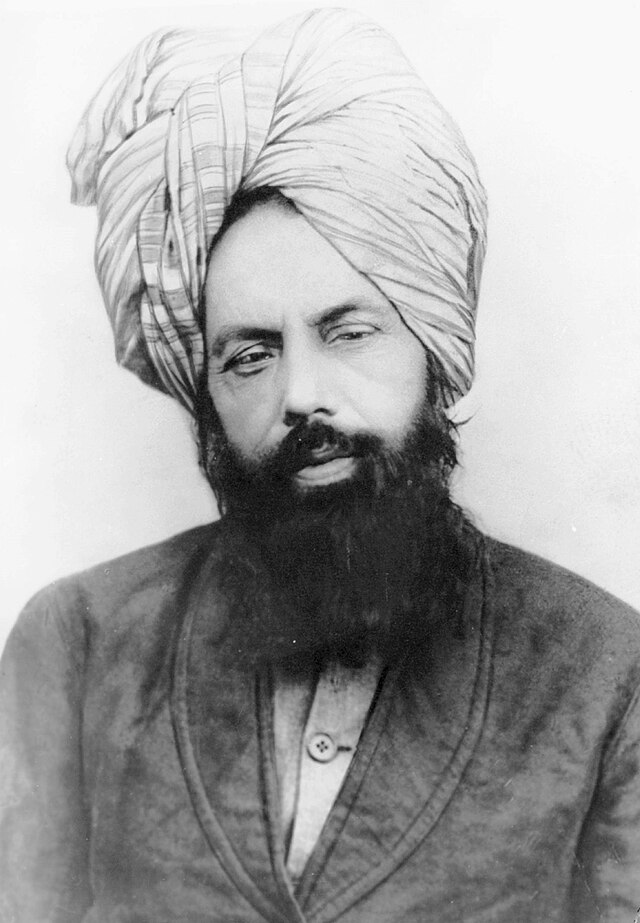
In a world often characterized by anguish, chaos, and disorder, the pursuit of inner peace becomes an invaluable endeavor. The metaphorical “beasts” that surround us represent various external factors, ranging from societal pressures to global crises that threaten our tranquility. The concept of a “Citadel of Peace” stands as an ideal, an aspiration, and a beacon of hope. The term evokes the image of a sanctuary, a place where harmony, cooperation, and understanding reign supreme. The Promised Messiah (peace be upon him) and his teachings are a citadel of peace in this day and age, needed to combat religious crises, find solutions for global crises, and encourage self-realization and identity.
Throughout human history, doctrines and ideologies have played a pivotal role in shaping societies. However, one undeniable truth is that teachings change over time. Teachings are often subject to interpretation, and communities seek to apply them to new contexts and situations. As the human mind evolves, the real essence of the teachings might get lost, leading to divisions based on varying interpretations. The same can be seen in the history of Islam, as the Holy Prophet (peace and blessings of Allah be upon him) said:
“And my Ummah will split into seventy-three sects. All of them are in the Fire except one sect” (Tirmidhi, 2641).
Each sect interprets Islam and its teachings in its own way, often developing enmity toward others. Though more than one billion Muslims exist in the world, they call each other infidels and disagree ideologically. Mullahs and Maulvis have directed people to extremism, diverting some away from true religion, using this as a tool for personal gain. The Promised Messiah (peace be upon him) states:
“The doctrine of Jihad as understood and propagated by the Muslim divines of this age, who are called Maulvis, is utterly incorrect. It can lead to nothing except that, by their forceful preaching, they would convert common people into wild beasts and deprive them of all the good qualities of human beings, and so it has happened. Ignorant Maulavis, may God guide them, have grievously misled the common people and have told them that such action, which is sheer wrong and cruelty and is opposed to all moral values, is the key to paradise.”
(Essence of Islam, Vol 2, pg 329)
So-called Islamic ideologies, led by clerics, have veered toward extremism, distorting the true image of Islam. In this age, God sent the Promised Messiah (peace be upon him) to protect Islam, strengthen its walls, and address the internal and external threats Muslims face. As he writes:
“Reason requires that in this time of peril when forces of opposition have erupted in the world and the internal condition of Muslims has seriously deteriorated, some reformer should appear to repel the mischief of the cross and to purify the internal condition of Muslims.”
(Essence of Islam, Vol 4, pg 190)
Though Islam was perfected, its teachings were forgotten, and a reformer was needed to reveal the truth. The evolution of teachings through reform is integral to human intellectual and spiritual growth. Reformers, driven by deep understanding and moral courage, reshape teachings to address contemporary needs and challenges.
Self-realization and identity are fundamental to human existence, shaping our understanding of who we are, what we value, and how we navigate the world. The journey involves discovering our authentic selves, understanding our values and beliefs, and aligning our actions with inner truths. Today, as people seek worldly pleasures, they forget their true purpose. Many question if God exists, and if so, how they can reach Him. The Promised Messiah (peace be upon him) explains how the Holy Prophet (peace and blessings of Allah be upon him) transformed society through Islam’s true teachings:
“None but the Holy Prophet (peace and blessings of Allah be upon him) could have brought about this great reformation. He taught human values to people who were savages and brutes. In other words, he transformed brutes into men, men into civilized men, and civilized men into godly men. He infused spiritual qualities into them and established their communion with the True God.”
(Lecture Sialkot, pg 6)

This transformation occurred due to prayer and the example of the Holy Prophet (peace and blessings of Allah be upon him). Islam teaches man to focus on his natural state, then strive towards a moral state, and ultimately reach the spiritual state. The Promised Messiah (peace be upon him) writes in The Philosophy of Teachings of Islam:
“This reproving self is the second source of the human state from which the moral state is generated. At this stage, man ceases to resemble animals… In short, this is the moral state of human self when it seeks to comprehend high moral qualities and is disgusted with disobedience, but cannot achieve complete success.”
(pgs 5-6)
Man, in striving for Nafs-e-Mutmainna (the soul at peace), finds true contentment and realizes his identity. Hazrat Musleh Maud (may Allah be pleased with him) elaborates on this in the five-volume commentary of Surah Fajr, verse 28:
“At this stage, called the heavenly stage, man is freed from all weakness and frailty and is braced with a peculiar spiritual strength… So the God-intoxicated man, at this stage, casting off all trammels, becomes attracted unrestrainedly towards his Maker.”
The Promised Messiah’s (peace be upon him) writings fortify man from the evils of this world. With true awareness of the Creator, man finds peace in this Citadel and connects with God to understand his identity.
The world today faces interconnected global crises, often leaving individuals feeling powerless. However, history shows that individuals and communities, driven by passion and vision, can catalyze change. Global crises often stem from immoral values, societal actions, or mindsets. When the Holy Prophet (peace and blessings of Allah be upon him) first migrated to Medina, he created a Charter to ensure peaceful coexistence. Huzoor (may Allah be his Helper) stated in his Peace Symposium on November 8, 2014:
“The Holy Prophet (peace and blessings of Allah be upon him) immediately stated that it was essential that they all lived together in peace and harmony… Each group and each tribe were given their due rights. The lives and wealth of all parties were guaranteed…”
When people understand their rights toward others, societies truly prosper. Huzoor (may Allah be his Helper) stated in another Peace Symposium on March 20, 2010:
“The founder of the Ahmadiyya Muslim Community has also taught us that the majority of Muslims and non-Muslims have forgotten their fundamental teachings and have gone far away from God. This growing distance from God and religion is increasing restlessness…”
When people lose sight of their true purpose, great problems arise. A reformer is needed to fortify societies. The Promised Messiah (peace be upon him), driven by conviction and resilience, inspired communities to address global issues, providing collective support, goals, and amplified impact.
God Almighty sent a Reformer as a Citadel of Peace in a time of peril. Through his teachings, the Promised Messiah (peace be upon him) abolished extremism, revealed Islam’s true essence, and offered solutions for global crises, guiding people toward their true purpose. Since his time, society has faced numerous challenges. People need an ideology to bring them out of the “land of beasts” and into a Citadel of Peace. The answers lie in the writings of the Promised Messiah (peace be upon him), fulfilling the promise:
“I shall protect everyone who is within the four walls of your home.”



